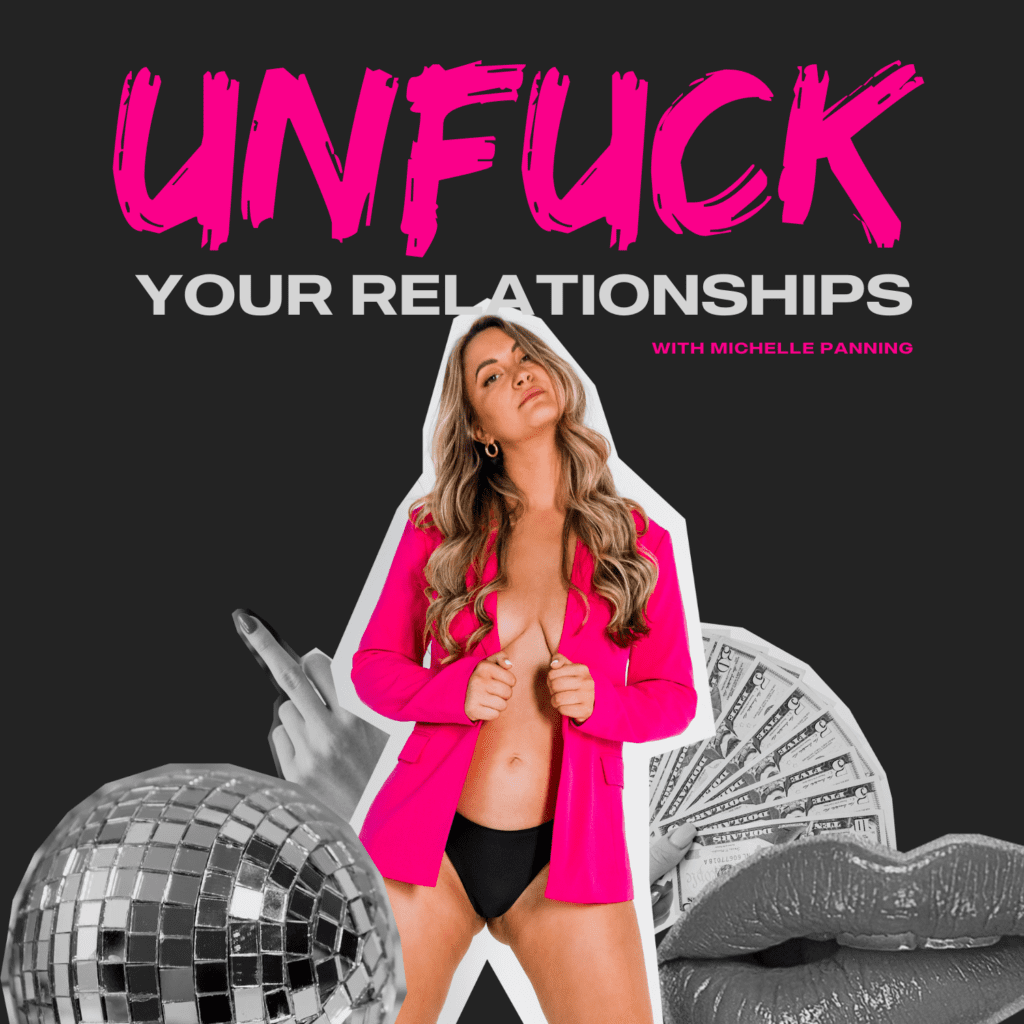Improving Communication: A Conversation with Shannon Torres
July 17, 2023
Hello, my loves. Today, I am here with one of my lovely clients, Shannon Torres, and I’m so excited for you all to play fly-on-the-wall to this conversation. We’ve been working together
for about a year. Shannon’s done Connected Woman—twice—as well as Swipe Right, Main Character Energy, and is now working with me privately.
The girl is committed. But the reason that I wanted her to come on and chat today is because she recently started her own business all about communication, confidence, and navigating conflict.

Meet Shannon Torres!
Michelle: Go ahead and introduce yourself, bitch!
Shannon: I feel so flattered right now! So, my name is Shannon Torres. I’ve been working with Michelle, like she said, for over a year now, and I started a coaching business hitting on confidence, conflict, and improving communication because those are areas that I’ve found to be crucial when it comes to changing your life for the better.
They were areas that I thought that I was doing really well in; I thought there was just a little piece missing, but I didn’t know what.
Instead, after doing numerous deep dives, I realized there was a huge fucking gap that I had to navigate through when it came to improving communication. And once I did, it completely transformed how I communicate with people, and I wanted to help share that with others as well.
The Prerequisite to Improving Communication With Others
Michelle: Did you know that you wanted to start a business when you first came into my world?
Shannon: I absolutely did not. I did not know that until this year. It came as a surprise, but for me, it’s just about creating a space to help serve others in creating a life of embodiment and honesty and being able to communicate effectively without fear of failure.
The fact is, whenever we work on improving communication, things are going to shift, but it doesn’t have to be scary. And it doesn’t mean it’s going to be for the worse. It’s always for the better, even when it doesn’t feel great all the time…and it’s not going to feel great all the time.
In many of our Connected Woman sessions, during those beautiful homework assignments you gave us, I found myself crying on my floor because I was finally improving communication with myself.
A lot of the gap between your ability to communicate with other people is whether you’re even able to have these conversations with yourself.
During those times I did find myself bawling, it was because I was finally having that conversation or hearing myself, whether it was through journaling or some of the exercises and just being present with myself.
It’s a beautiful sadness, because you can’t believe you haven’t been listening to yourself for so long, but you’re so happy that you finally are. It changes everything.
Michelle: I love this. It’s so unsexy to talk about building a relationship and improving communication with yourself—the majority of people just want to be taught how to use communication skills with a partner—but I’m like, “Bitch, if you can’t have an honest conversation with yourself, what the fuck makes you think you’re going to do that with a partner?”
Shannon: How are you supposed to communicate how you feel about something if you don’t actually know how you feel about it? You can’t.
The easy solution is, “Well, I want them to stop doing X thing.” Okay, cool. What’s the actual issue? What isn’t being met for you? What’s hurting you? What’s upsetting you? Until you’re willing to talk to yourself first to figure out what that is, it’s just going to come across the other person like verbal vomit. And then they’re going to be able to derail you, because you don’t have that confidence in yourself to stand in your own conversation at that point.
Women Who Want
Michelle: Do you feel like women in particular have a resistance to even admitting that they want something?
Shannon: Oh my God, yes. I was just talking about this the other day, actually. We joke around about women are constantly answering “Oh, are you okay?” with something like “Yeah, I’m fine.” But the reality is, a lot of women are raised to believe that if you’re being too emotional, it’s wrong, but if you don’t care enough, then you’re being an ice queen. I’ve been called that so many times in the past, and it puts you in this weird place where you’re like, “Well, I can’t be overly emotional about this, but I can’t not care about it, so I guess everything is fine.” Because what else can you do?
Michelle: What do I always say? In the beginning of my calls, I start out with, “I want you to share one word in the chat for how you’re feeling. Good and fine are not feelings.”

Learning to Share
Michelle: So, let’s go back a bit. You said you used to get told that you were an ice queen all the time, which is fucking shocking to me, because you are the furthest thing from that.
I see you as someone who is so warm, open, compassionate, empathetic, curious, communicative…all of those things. Definitely not frigid. I’d love to hear a bit about your journey to get to this point.
Shannon: Well, part of improving communication is learning to express our emotions. We aren’t all raised knowing how to express our emotions, right?
I know you’ve spoken before about how our parents are doing the best that they can with the tools that they have, but we have a generation of people coming through that has watched a lot of people that they love and care about stay in situations where they weren’t totally happy.
I was among that group. And when you’ve grown up watching someone suffer in silence, you indirectly learn not to express your emotions. Maybe behind closed doors, you’re feeling all your feelings, but you never learn how to communicate them. You don’t know what to say, or how to feel. And I started to realize that there was some stuff that I needed to navigate when I started going to therapy when I was a teenager, but it didn’t come to fruition until I started getting into group containers.
Now, the beautiful thing about working in groups is that you have people who watch you, and this speaks to embodiment, right? This speaks to reacting to something physically, even if you’re not able to articulate it verbally.
At one point, I was sitting there going, “Oh, I’m fine. I don’t really care. It doesn’t bother me.” And someone else said, “Well, you’re saying that it’s fine, but I’ve been watching. You have not stopped shaking your leg for the past fifteen minutes. You are clearly not fine with the situation.”
That was the first time I realized that I wasn’t fully letting myself feel everything the way I needed to.
I ended up with a master’s degree in counseling. I wanted to learn everything. I wanted to help others with improving communication. And that journey is hard, but that’s what makes it so that you realize that you want to teach it, because it’s so important.

Accidental Under-Communication
Michelle: One of the things I heard about improving communication is that we are not communicating nearly as much as we think we are. Because everyone, particularly in romantic relationships, often says, “I’ve communicated that,” while the other person is like, “I’m hearing about this for the first time.” Even in my relationship, Drew would sometimes say, “You’ve literally never said that,” and I’m like, “I have, like a million times.” But in actuality, I never said it clearly.
Shannon: Or you’ve had the conversation so many times in your head that maybe you think you’ve said it out loud, or you think you said a rendition of it. That’s where the lack of the clear communication comes in, too, because insinuating is not the same as communicating.
Michelle: Where do you feel people get really stuck when it comes to improving communication?
Shannon: Fear. When you finally do realize how you feel about something and you don’t know how the other person’s going to react or what the outcome’s going to be, especially if it’s a tough conversation, it’s terrifying. It might change things.
And in reality, improving communication to the point of verbalizing that probably will change things, but there’s uncertainty about whether it will change things for the better or for the worse.
But here’s the question you need to ask in the face of that fear: Do you value yourself enough to speak about it?
Michelle: Exactly. People often fall into the trap of valuing the relationship or the other person’s feelings over their own.
Now, of course you want to value the other person’s feelings. You want to be honest without being an asshole, you know? Delivery matters.
Shannon: You can deliver truth with grace. And grace doesn’t mean not being honest and not saying what the issue is. It means, are you being clear? Are you being honest? And are you saying it from a place of love, or are you communicating it from a place of reactivity and fear?
Work With Shannon!
If you’re in need of some help with improving communication, please, please reach out to Shannon. I cannot recommend her enough. All the links will be below for you. You have no idea how much this girl can help you change your whole fucking life!
WORK WITH SHANNON:
https://www.confidentconvos.com/
CONNECT WITH SHANNON:
Instagram: https://www.instagram.com/shan3lise/
WORK WITH MICHELLE:
Join Main Character Energy, a 6-week course on becoming the main character of your life and stepping into delusional confidence: https://michellepanning.com/main-character-energy
Ready to do the work? You can find all courses, masterclasses, and more right here: https://michellepanning.com/all-offers
CONNECT WITH MICHELLE:
Instagram: http://www.instagram.com/michellepanning
Website: http://www.michellepanning.com

Improving Communication: A Conversation with Shannon Torres
MINDSET & EMBODIMENT MENTOR
I'm Michelle
about the host
I get it, girl. I’ve been there too. For years, I was going through the same experiences with men over and over again that left me feeling confused, anxious and pissed off.
I silenced myself in dating and relationships because I was terrified of being judged, rejected and abandoned. It all changed when I went through a break-up and thought “enough is enough. I cannot continue to repeat the same relationships with different men! Something HAS to change!”